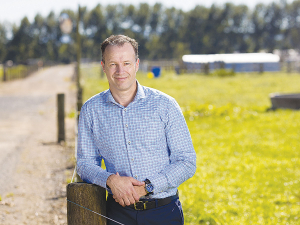Rewarding farmers who embrace sustainability
Winners of DairyNZ’s Sustainability and Stewardship awards in the Ballance Farm Environment Awards have their eyes firmly fixed on progressing a positive future for New Zealand dairy.
 DairyNZ outgoing chief executive Tim Mackle says on-farm inflation is one of the biggest concerns impacting profitability.
DairyNZ outgoing chief executive Tim Mackle says on-farm inflation is one of the biggest concerns impacting profitability.
Farm costs have risen 33% over the past years to top on average $9.17/kgMS last season, according to DairyNZ.
Data also shows that, on average, farm costs increased by around 13% between the past two seasons (2021/22 and 2022/23).
However, costs are forecast to reduce from around $9.17/kgMS last season to around $8.96/kgMS for the new season that started June 1.
DairyNZ chief executive Tim Mackle says it is good to be seeing a slight reduction in farm expenses, particularly for urea and supplementary feed, but costs are still high.
"We are hearing from farmers that on-farm inflation is one of the biggest concerns impacting their profitability, as they have experienced significant price increases in the past year," says Mackle.
DairyNZ has launched an online tool - DairyNZ Econ - to help farmers better understand the current economic environment.
Mackle says farmers are focused on managing rising costs at the start of the new dairy season.
"Every farm is different but, given the scale of cost increases in the past few seasons, many farms will be feeling the current profit squeeze.
"They will likely be starting the season with inflation, farm costs and milk prices front of mind, and considering how to approach the year ahead.
"That's why we are focused on supporting our farmers through current market conditions. We are excited to launch our new DairyNZ Econ Tracker to farmers, which provides some of the latest information on the New Zealand dairy sector, including farm economics.
"This is a central platform where farmers can gain information to help understand their operating environment, track sector trends, and then apply the information to their individual farm businesses."
The DairyNZ Econ Tracker builds on the availabel information from the DairyNZ Economic Survey and Dairy Statistics and provides a snapshot of the dairy sector's economic situation.
Information will include forecasts applying regional and national average data, providing useful trends to observe for farmers to consider the application to their individual farms.
"Farmers can use this data to help look for trends and understand the current economic environment, including what is happening now and what may happen in the near future, to support their budgeting and farm business planning."
Context and information provided from the Econ Tracker will help farmers prepare for different scenarios in the seasons ahead. DairyNZ has also been working with farmers to understand what they are doing to farm through the current economic environment.
Farmers' top tips include surrounding yourself with people who understand farming and its outlook, having a strong support team and ensuring young stock have the best possible start.
These tips and more are available on DairyNZ's website.
The new DairyNZ Econ Tracker is available online at dairynz.co.nz/econtracker.
Deeply cynical and completely illogical. That's how Kimberly Crewther, the executive director of DCANZ is describing the Canadian government's flagrant breach of international trade law in refusing to open its market to New Zealand dairy exports.
This week the winner of the prestigious Ahuwhenua Trophy for the top Māori Dairy farm will be announced at a gala dinner in Hamilton.
Once-a-day milking (OAD) can increase or lower the amounts of proteins in milk, according to a new study published in the journal Dairy.
Rabobank says climate change creates both risks and opportunities for the bank and its clients and that the food and agriculture sector needs to recognise the potential for both.
Eastern Bay of Plenty farmer Rebecca O’Brien was named the 2024 Dairy Women’s Network (DWN) Regional Leader of the Year.
Humbling, overwhelming, and an absolute honour. That’s how 2024 Fonterra Dairy Woman of the Year Katrina Roberts describes her win at the Dairy Women’s Network conference earlier this month.